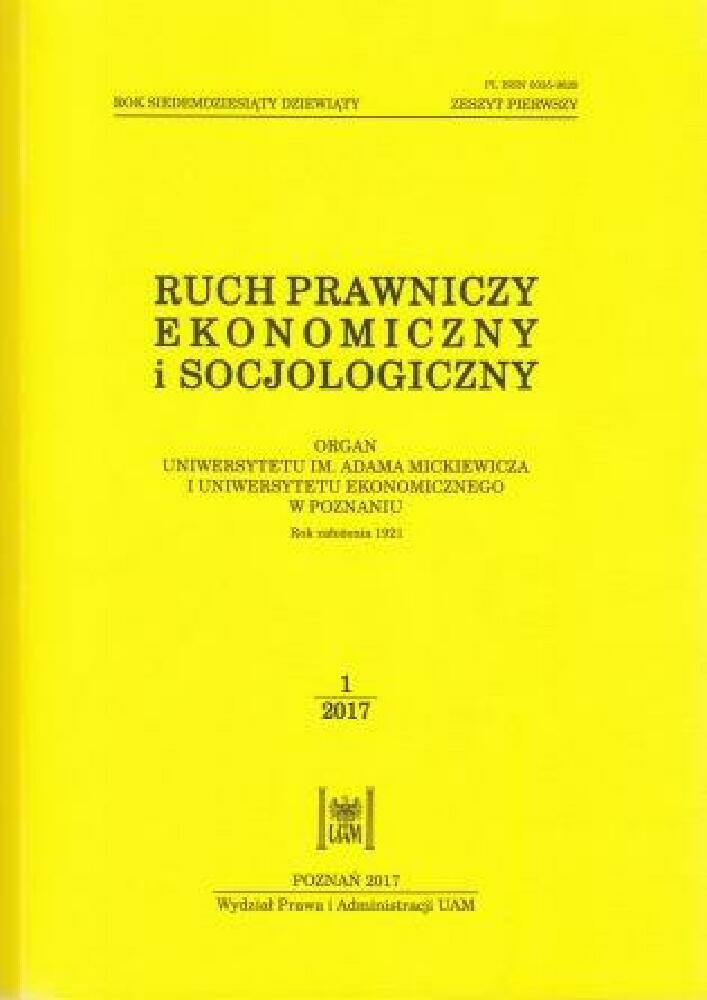Abstract
After the recent financial crisis, a debate on the fundamental categories and mechanisms of market economy in a capitalist system and the role of the State in it has intensified. In Poland, this debate became even more significant after certain government documents (the Plan, followed by the Strategy of Responsible Development, commonly termed Morawiecki’s Plan and Strategy)had been publicised. The view of the role played by the State in the economy is one of the main determinants that divides the science of economy into different schools, and constitutes the grounds upon which different economic doctrines emerge. The ongoing debate on the mechanisms of the functioning of economy in Poland and worldwide has been examined in the context of the historical dispute regarding the role of the State in market economy.
References
Acemoglu D., (2008), The Crisis of 2008: Structural Lessons for and from Economics, http://econ-www.mit.edu/files/3703.
Aikins, S.K. (2009), Global financial crisis and government intervention: a case for effective regulatory, International Public Management Review 10(2): 23–43.
Boyer, R. (2000), Is a finance-led growth regime a viable alternative to Fordism? A preliminary analysis, Economy and Society 29(1): 111–145.
Fullbrock, E. (2007), Economics and neo-liberalism, [w:] Hassan, G. (ed.), After Blair: Politics after The New Labour Decade, Lawrence & Wishart, London: 160–172.
Gruszewska, E. (2013), Instytucje, a proces tworzenia kapitału w Polsce, Wydawnictwo Uniwersytetu w Białymstoku, Białystok.
Harvey, D. (2008), Neoliberalizm. Historia katastrofy, Instytut Wydawniczy Książka i Prasa, Warszawa.
Hayek, F.A. von (1998), Droga do zniewolenia, Arcana, Warszawa.
Heilbroner, R.L. (1985), Ponad ekonomiczną rewolucją, [w:] Ponad ekonomią, PIW, Warszawa: 150–162.
Kochanowicz, J. (2000), Dwoista konsolidacja. Transformacja ekonomiczna i zmiana instytucjonalna, Ekonomista 3: 305–323.
Kołodko, G. (2008), Wędrujący Świat, Pruszyński i S-ka, Warszawa.
Konings, M. (2009), Rethinking neoliberalism and the subprime crisis: beyond the re-regulation agenda, Competition and Change 13(2): 108–127.
Kotz, D.M. (2015), Neoliberalism, Globalization, Financialization: Understanding Post-1980 Capitalism, https://www.umass.edu/economics/sites/default/files/Kotz.pdf [dostęp: 7.01.2017].
Kotz, D.M. (2015), The Rise and Fall of Neoliberal Capitalism, Harvard University Press.
Lewis, N. (2014), Keynes and Rothbard Agreed: Today's Economics is Mercantilism, http://www.forbes.com/sites/nathanlewis/2014/01/23/keynes-and-rothbard-agreed-todays-economics-is-mercantilism/#1813c32c3983 [dostęp: 7.01.2017].
Lin, J.Y. (2012), New Structural Economics. A Framework for Rethinking Development and Policy, The World Bank, Washington D.C.
Łukmanow, A.S. (2013), Lobbism w Rossii: Analiz sovremennoj specyfiki, Sborniki konferencji NIC Socijosfera 45: 153–158.
Mączyńska, E., Pysz, P. (2014), Liberalizm, neoliberalizm i ordoliberalizm, Ekonomista 3: 221–247.
Mazucatto, M. (2016), Przedsiębiorcze państwo, Wydawnictwo Ekonomiczne “Heterodox”, Poznań.
Ministerstwo Rozwoju (2016), Strategia na rzecz Odpowiedzialnego Rozwoju, Warszawa, https://www.mr.gov.pl/media/23749/SOR_29072016_projekt.pdf [dostęp: 7.01.2016].
Mitrović, L.R. (2007), Immanuel Wallerstein’s Contribution to Mondology and the Critical Theory of the Global World System Transition, Facta Universitatis, Series: Philosophy, Sociology and Psychology 6(1): 91–104.
Nowakowski, K. (2014), Kapitalizm państwowy jako dylemat teoretyczny i praktyczny, Ruch Prawniczy, Ekonomiczny i Socjologiczny 76(1): 225–239.
Palley, T.I. (2005), From Keynesianism to neoliberalism: shifting paradigms in economics, [w:] Saad-Filho, A., Johnston, D., (eds.), Neoliberalism – A critical Reader, Pluto Press, London: 20–29.
Palley, T.I. (2009), The Macroeconomics of Financialization: A Stages of Development Approach, Ekonomiaz N.º 72, 3.er cuatrimestre: 34–53.
Piątek, D. (2016, Instytucje państwa a wzrost gospodarczy w krajach postsocjalistycznych, Wydawnictwo UEP, Uniwersytet Ekonomiczny w Poznaniu, Poznań.
Ratajczak, M. (2008), Ekonomia jako nauka, [w:] Sławińska, M., Witczak, H. (red.), Podstawy metodologiczne prac doktorskich w naukach ekonomicznych, PWE, Warszawa: 19–32.
Ratajczak, M. (2010, Kryzys gospodarczy a rozwój ekonomii jako nauki, [w:] Grzelak, A., Pająk, K. (red.), Nowe trendy w metodologii nauk ekonomicznych, t. 1: Problemy ogólne metodologii nauk ekonomicznych, Wydawnictwo Uniwersytetu Ekonomicznego w Poznaniu, Poznań: 290–309.
Ratajczak, M. (2017), Liberalizm i neoliberalizm ekonomiczny w perspektywie historycznej, Ekonomista 1.
Rodrik, D. (2013), The New Mercantilist Challenge, Project Syndicate, https://www.project-syndicate.org/commentary/the-return-of-mercantilism-by-dani-rodrik?barrier=true [dostęp 7.0.2017]
Thorsen, D.E. (2009), The Neoliberal Challenge: What is Neoliberalism?, Department of Political Science, University of Oslo, Working Paper October 10, http://folk.uio.no/daget/neoliberalism2.pdf [dostęp: 7.01.2017].
Van Brabant, J.M. (1992), Privatizing Eastern Europe, Kluwer, Dordrecht.
Żelew, Ż. (1993), Demokracja w społeczeństwie posttotalitarnym, Gazeta Wyborcza 77: 8.
License
Copyright (c) 2017 WPiA UAM

This work is licensed under a Creative Commons Attribution-NonCommercial-NoDerivatives 4.0 International License.




